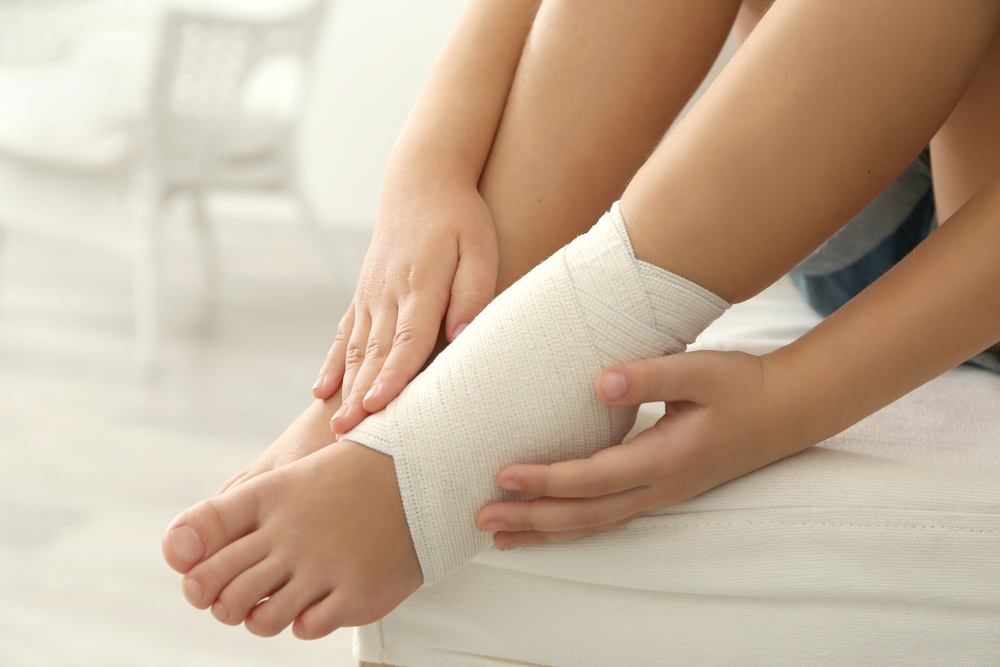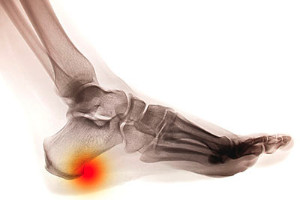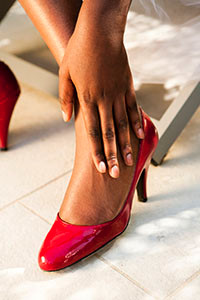Connect With Us
Blog
Items filtered by date: August 2019
Plantar Warts Can Be Treated!
A Common Form of Ankle Pain is Sprains
 Ankle pain can occur for a variety of reasons. A large percentage of ankle pain often includes ankle sprains, and this typically happens if the ankle rolls inwards. This can occur as a result of stepping off of a curb unexpectedly, which can cause the ligaments to overstretch and tear. The symptoms of an ankle sprain that many patients experience can include bruising on and around the affected site, swelling and tenderness, and it may even be difficult to walk. When treatment is started, it is important to keep the weight off of the foot as much as possible. This can be accomplished by using crutches, and frequently elevating the foot. Support may be found when an elastic bandage is wrapped around the ankle, or a brace may also be used. An ankle sprain is one form of ankle pain. If you have ankle pain for any reason, it is suggested to speak to a podiatrist who can offer the best treatment options.
Ankle pain can occur for a variety of reasons. A large percentage of ankle pain often includes ankle sprains, and this typically happens if the ankle rolls inwards. This can occur as a result of stepping off of a curb unexpectedly, which can cause the ligaments to overstretch and tear. The symptoms of an ankle sprain that many patients experience can include bruising on and around the affected site, swelling and tenderness, and it may even be difficult to walk. When treatment is started, it is important to keep the weight off of the foot as much as possible. This can be accomplished by using crutches, and frequently elevating the foot. Support may be found when an elastic bandage is wrapped around the ankle, or a brace may also be used. An ankle sprain is one form of ankle pain. If you have ankle pain for any reason, it is suggested to speak to a podiatrist who can offer the best treatment options.
Ankle pain can be caused by a number of problems and may be potentially serious. If you have ankle pain, consult with Dr. Nicholas Przystawski from Central Florida Foot Care, PA. Our doctor will assess your condition and provide you with quality foot and ankle treatment.
Ankle pain is any condition that causes pain in the ankle. Due to the fact that the ankle consists of tendons, muscles, bones, and ligaments, ankle pain can come from a number of different conditions.
Causes
The most common causes of ankle pain include:
- Types of arthritis (rheumatoid, osteoarthritis, and gout)
- Ankle sprains
- Broken ankles
- Achilles tendinitis
- Achilles tendon rupture
- Stress fractures
- Bursitis
- Tarsal tunnel syndrome
- Plantar fasciitis
Symptoms
Symptoms of ankle injury vary based upon the condition. Pain may include general pain and discomfort, swelling, aching, redness, bruising, burning or stabbing sensations, and/or loss of sensation.
Diagnosis
Due to the wide variety of potential causes of ankle pain, podiatrists will utilize a number of different methods to properly diagnose ankle pain. This can include asking for personal and family medical histories and of any recent injuries. Further diagnosis may include sensation tests, a physical examination, and potentially x-rays or other imaging tests.
Treatment
Just as the range of causes varies widely, so do treatments. Some more common treatments are rest, ice packs, keeping pressure off the foot, orthotics and braces, medication for inflammation and pain, and surgery.
If you have any questions, please feel free to contact our office located in Leesburg, FL . We offer the newest diagnostic and treatment technologies for all your foot care needs.
Read more about Ankle Pain
Possible Causes of Heel Spurs
 Many patients have pain in the heel area of the foot, and this may be indicative of condition that is known as a heel spur. It is considered to be a bony growth that forms underneath the heel and may be hooked or pointed. It grows toward the middle of the foot and can cause pain in the arch. The symptoms that are associated with heel spurs often include heel pain upon arising in the morning, swelling and heat coming from the affected heel, and the foot may feel achy as the day progresses. It can develop for a variety of reasons. These can consist of an injury that has occurred to the heel, participating in running and jumping activities, and wearing shoes that do not fit correctly. If you feel you may have developed a heel spur, it is advised to seek the counsel of a podiatrist who can determine what the best treatment is for you.
Many patients have pain in the heel area of the foot, and this may be indicative of condition that is known as a heel spur. It is considered to be a bony growth that forms underneath the heel and may be hooked or pointed. It grows toward the middle of the foot and can cause pain in the arch. The symptoms that are associated with heel spurs often include heel pain upon arising in the morning, swelling and heat coming from the affected heel, and the foot may feel achy as the day progresses. It can develop for a variety of reasons. These can consist of an injury that has occurred to the heel, participating in running and jumping activities, and wearing shoes that do not fit correctly. If you feel you may have developed a heel spur, it is advised to seek the counsel of a podiatrist who can determine what the best treatment is for you.
Heel spurs can be incredibly painful and sometimes may make you unable to participate in physical activities. To get medical care for your heel spurs, contact Dr. Nicholas Przystawski from Central Florida Foot Care, PA. Our doctor will do everything possible to treat your condition.
Heels Spurs
Heel spurs are formed by calcium deposits on the back of the foot where the heel is. This can also be caused by small fragments of bone breaking off one section of the foot, attaching onto the back of the foot. Heel spurs can also be bone growth on the back of the foot and may grow in the direction of the arch of the foot.
Older individuals usually suffer from heel spurs and pain sometimes intensifies with age. One of the main condition's spurs are related to is plantar fasciitis.
Pain
The pain associated with spurs is often because of weight placed on the feet. When someone is walking, their entire weight is concentrated on the feet. Bone spurs then have the tendency to affect other bones and tissues around the foot. As the pain continues, the feet will become tender and sensitive over time.
Treatments
There are many ways to treat heel spurs. If one is suffering from heel spurs in conjunction with pain, there are several methods for healing. Medication, surgery, and herbal care are some options.
If you have any questions feel free to contact our office located in Leesburg, FL . We offer the latest in diagnostic and treatment technology to meet your needs.
Read more about Heel SpursPossible Causes of Heel Spurs
If you are experiencing heel pain, it may be indicative of a condition that is referred to as a heel spur. It is defined as a bony growth that can be hooked or pointed, and grows underneath the heel. Some of the symptoms that are associated with heel spurs consist of pain that is felt after arising in the morning, inflammation and tenderness surrounding the affected area, and warmth near the heel. This ailment occurs as a result of strained muscles and ligaments that damage the soft tissues in the heel. They may form from the aging process, participating in running and jumping activities, or wearing shoes that do not fit correctly. If you feel you may have developed a heel spur, it is advised that you consult with a podiatrist who can properly diagnosis and treat this condition.
Heel spurs can be incredibly painful and sometimes may make you unable to participate in physical activities. To get medical care for your heel spurs, contact Dr. Nicholas Przystawski from Central Florida Foot Care, PA. Our doctor will do everything possible to treat your condition.
Heels Spurs
Heel spurs are formed by calcium deposits on the back of the foot where the heel is. This can also be caused by small fragments of bone breaking off one section of the foot, attaching onto the back of the foot. Heel spurs can also be bone growth on the back of the foot and may grow in the direction of the arch of the foot.
Older individuals usually suffer from heel spurs and pain sometimes intensifies with age. One of the main condition's spurs are related to is plantar fasciitis.
Pain
The pain associated with spurs is often because of weight placed on the feet. When someone is walking, their entire weight is concentrated on the feet. Bone spurs then have the tendency to affect other bones and tissues around the foot. As the pain continues, the feet will become tender and sensitive over time.
Treatments
There are many ways to treat heel spurs. If one is suffering from heel spurs in conjunction with pain, there are several methods for healing. Medication, surgery, and herbal care are some options.
If you have any questions feel free to contact our office located in Leesburg, FL . We offer the latest in diagnostic and treatment technology to meet your needs.
Read more about How to Treat Heel SpursPossible Causes of Cuboid Syndrome
 There are ligaments that surround the cuboid bone, and if an injury should occur that affects this part of the foot, a condition that is known as cuboid syndrome may develop. You may notice pain and discomfort on the side of your foot, and it can worsen as weight is put on it. Some patients can lose the ability to move the foot, and the toes may appear swollen and weak. The most common causes of this type of injury can include twisting your ankle during a fall, or participating in sporting activities which can cause ankle pain. Additionally, this ailment can develop from wearing shoes that do not fit correctly, being overweight, or not stretching the feet before exercising. Mild relief can be found when the affected foot is elevated, and it may be beneficial to wrap the ankle with an elastic bandage that provides support. If you have pain on the side of your foot, it is suggested that you speak to a podiatrist who can properly treat this condition.
There are ligaments that surround the cuboid bone, and if an injury should occur that affects this part of the foot, a condition that is known as cuboid syndrome may develop. You may notice pain and discomfort on the side of your foot, and it can worsen as weight is put on it. Some patients can lose the ability to move the foot, and the toes may appear swollen and weak. The most common causes of this type of injury can include twisting your ankle during a fall, or participating in sporting activities which can cause ankle pain. Additionally, this ailment can develop from wearing shoes that do not fit correctly, being overweight, or not stretching the feet before exercising. Mild relief can be found when the affected foot is elevated, and it may be beneficial to wrap the ankle with an elastic bandage that provides support. If you have pain on the side of your foot, it is suggested that you speak to a podiatrist who can properly treat this condition.
Cuboid syndrome, also known as cuboid subluxation, occurs when the joints and ligaments near the cuboid bone in the foot become torn. If you have cuboid syndrome, consult with Dr. Nicholas Przystawski from Central Florida Foot Care, PA. Our doctor will assess your condition and provide you with quality foot and ankle treatment.
Cuboid syndrome is a common cause of lateral foot pain, which is pain on the outside of the foot. The condition may happen suddenly due to an ankle sprain, or it may develop slowly overtime from repetitive tension through the bone and surrounding structures.
Causes
The most common causes of cuboid syndrome include:
- Injury – The most common cause of this ailment is an ankle sprain.
- Repetitive Strain – Tension placed through the peroneus longus muscle from repetitive activities such as jumping and running may cause excessive traction on the bone causing it to sublux.
- Altered Foot Biomechanics – Most people suffering from cuboid subluxation have flat feet.
Symptoms
A common symptom of cuboid syndrome is pain along the outside of the foot which can be felt in the ankle and toes. This pain may create walking difficulties and may cause those with the condition to walk with a limp.
Diagnosis
Diagnosis of cuboid syndrome is often difficult, and it is often misdiagnosed. X-rays, MRIs and CT scans often fail to properly show the cuboid subluxation. Although there isn’t a specific test used to diagnose cuboid syndrome, your podiatrist will usually check if pain is felt while pressing firmly on the cuboid bone of your foot.
Treatment
Just as the range of causes varies widely, so do treatments. Some more common treatments are ice therapy, rest, exercise, taping, and orthotics.
If you have any questions, please feel free to contact our office located in Leesburg, FL . We offer the newest diagnostic and treatment technologies for all your foot care needs.
Read more about All About Cuboid Syndrome

